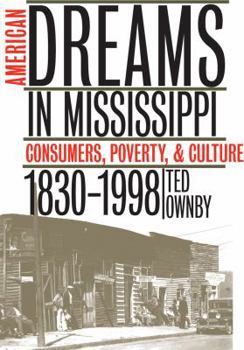American Dreams in Mississippi: Consumers, Poverty, and Culture, 1830-1998
Select Format
Select Condition 
Book Overview
The dreams of abundance, choice, and novelty that have fueled the growth of consumer culture in the United States would seem to have little place in the history of Mississippi--a state long associated with poverty, inequality, and rural life. But as Ted Ownby demonstrates in this innovative study, consumer goods and shopping have played important roles in the development of class, race, and gender relations in Mississippi from the antebellum era to...
Format:Paperback
Language:English
ISBN:0807848069
ISBN13:9780807848067
Release Date:May 1999
Publisher:University of North Carolina Press
Length:248 Pages
Weight:0.90 lbs.
Dimensions:0.7" x 6.1" x 9.2"
Customer Reviews
1 rating
Insightful Cultural History by a Great Young Historian
Published by Thriftbooks.com User , 22 years ago
...American Dreams in Mississippi is cultural (not economic) history. It is not about the reasons for poverty, but rather what it MEANS to live in a state that is perpetually impoverished while also living in a nation that bills itself as the Land of Opportunity. In this book, Ownby seeks to redefine the very concept of the American Dream. As his title suggests, there are in fact many dreams. Young and old, men and women, blacks and whites, rural and city folk all experience these dreams differently, and Ownby gives a voice to them all. With all due respect to the late C. Vann Woodword (who I am certain Dr. Ownby has the highest regard for) American Dreams in Mississippi goes beyond the boundaries of conventional history, asking questions historians have never asked about the South and using new kinds of sources like clothing, furniture, cars, and song lyrics as well as literature, general store ledgers, and obscure state documents to break new ground. The chapter "Men Buying Cloth" reveals the important discovery that Mississippi women, contrary to the national stereotype, were historically not consumers. The section on slave purchases is, to my knowledge, the only study of its kind, and the discussions of blues culture and Civil Rights boycotts add a fresh perspective to those topics. If some parts of this book require a little effort on the reader's part, it is only because Ownby's research and documentation are so thorough that he provides not just one but many examples to back up each point. As Ownby lays out in his first chapter, the book is also grounded in solid theory. More works of history should be so "dry." I urge all readers of this book -- especially graduate students in history looking for an excellent example of their craft -- to stick with it. It is well worth the journey.





